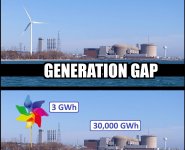Without the deployment of renewable energy since 2005, greenhouse gas emissions in 2012 could have been 7% higher than actual emissions, according to the EEA report 'Renewable energy in Europe – approximated recent growth and knock-on effects'.
Renewable technologies also increase energy security, the report found. Without the additional use of renewable energy since 2005, the EU's consumption of fossil fuels would have been about 7% higher in 2012. The most substituted fuel was coal, where consumption would have been 13% higher, while natural gas use would have been 7% higher, at a time when European gas reserves are dwindling.


